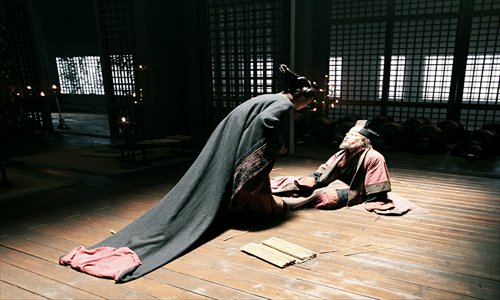Hungry for more

Two days after its November 29 premiere, director Lu Chuan's The Last Supper drew a thin crowd on a Saturday noon showing at Broadway Cinema in Dongcheng district. With The Life of Pi and 1942 both still in theaters, The Last Supper met with fierce competition.
The movie is Lu's attempt to interpret events of the Chu-Han Contention period (206 BC - 202 BC), which spanned the end of the Qin Dynasty (221 BC - 206 BC) and the beginning of the Han Dynasty (206 BC - 220 AD). Lu's film focuses on the first emperor of the Han Dynasty, Liu Bang (256 BC - 195 BC), and his opponent Xiang Yu (232 BC - 202 BC).
The "supper" in the movie title refers to Hong Men Yan (Feast at Hong Gate). In 206 BC, Xiang invited Liu to a grand feast with the intention of killing him, but the warlord ended up letting Liu go. The phrase hongmenyan has become a permanent part of the Chinese language, used as shorthand for an event or situation that seems wonderful on the surface but has dangerous underpinnings.
Lu isn't the first director to present this famous tale on the big screen. Perhaps for this very reason, his film attempts to capture the struggle from a different angle.
Instead of focusing on the dinner, Lu emphasizes the point that as a political figure, the emperor's whole life is one endless hongmenyan, as he fought and cheated to control more land and later killed off those who fought alongside him to take down the Qin.
The film is a brave attempt at storytelling considering its new angle on a piece of history that is already very familiar to Chinese. However, a strong central idea that tightly knits all the scenes of the film together is absent.
Lu, whose 2009 film City of Life and Death about the Nanjing Massacre in 1937 met with critical acclaim, is regarded as a major new voice in Chinese cinema. His all-star cast, including Liu Ye, Daniel Wu and Taiwan's Chang Chen, gave stellar performances to paint a picture of war, trickery and political struggle that took place more than 2,000 years ago. But their efforts cannot cover up the movie's flaw.
The film's opening scenes depict soldiers riding through an open, wild plain while a voice whispers, "My nightmare, my nightmare." Then the camera zooms in on Liu Bang, played by Liu Ye, who introduces himself and his political rival Xiang in the voice-over narration.
The movie starts near the end of Liu's life, just after he has killed Han Xin, one of his counselors whom he suspected of betrayal. Important events from Liu's life, such as joining Xiang's army, defeating Ziying, the last Qin Dynasty emperor, before breaking into the imperial palace, and most importantly, the Hong Men Yan, are all presented in flashbacks throughout the film.
The film has its high points. The scenes are portrayed in detail; Lu is excellent at capturing beauty and the nuances of fleeting moments on screen, such as the eye contact during a tense moment, the view from the Qin emperor's palace, and the facial expressions of those being killed. However, the effect would have been better if these scenes were more strongly connected. It isn't until the end that the theme becomes clear: Throughout his life, Liu had to put on a show. On the surface, all appears calm, but risks run beneath everything.
Nevertheless, there are some very well-done moments in the movie. Lu skillfully captures the characteristics of the Chinese political struggle. Pivotal actions and conversations are all presented in a subtle way that appears normal on the surface but symbolizes something much more grave.
For example, in one scene Liu's wife hands Xiao He, the emperor's doomed right-hand man, a scroll from the History of Han that is in the process of being written, which shares the details of Xiao's life. She tells him, "You are in charge of what we put here." The gesture clearly warns He of his potential demise, and reminds the audience that history is written by the victor. However, lacking a well-laid thematic foundation, scenes like this are isolated from each other in the storytelling.
Even though the film is disappointing at times, Lu's wonderful cinematography and perspective on history are sure to please audiences.